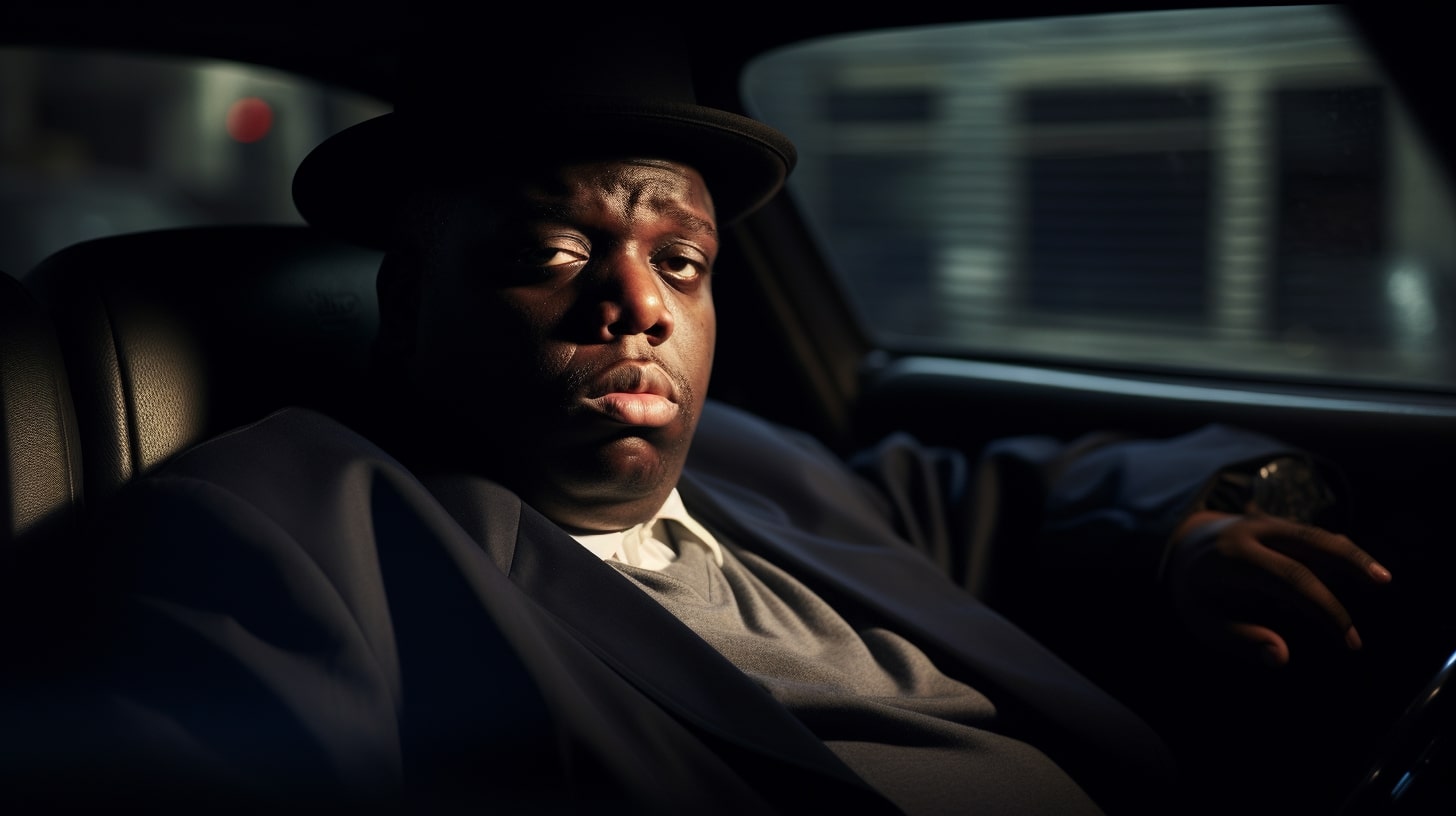The notorious hip-hop artist, Notorious B.I.G.’s life was cut short, leaving fans and the music community in shock. The circumstances surrounding his murder created an air of mystery that persists even today, with no one ever being held accountable for the crime.
Numerous theories and speculations materialized as the investigation progressed, yet no concrete evidence or suspects were ever identified. The unsolved nature of the Notorious B.I.G.’s death continues to contribute to its intrigue, making it a topic of enduring interest to both fans and true-crime enthusiasts alike.
Contents
The Life of Notorious B.I.G
Early Life and Career
Christopher George Latore Wallace, better known by his stage name The Notorious B.I.G., Biggie Smalls, or simply Biggie, was born on May 21, 1972, in Brooklyn, New York. He grew up near the Bedford-Stuyvesant neighborhood of Brooklyn and attended Roman Catholic schools for most of his education.
In the early 1990s, Biggie began his music career, starting with appearances on remixes and collaborations with other artists. In 1993, he signed with Bad Boy Records, a label founded by Sean “Diddy” Combs. Biggie quickly became one of the label’s flagship artists, contributing significantly to the success of Bad Boy Records.
Musical Achievements
Biggie’s debut album, “Ready to Die,” was released in 1994 and became a critical and commercial success. The album featured hits such as “Juicy,” “Big Poppa,” and “One More Chance,” showcasing his distinctive laid-back lyrical delivery and storytelling ability. The success of “Ready to Die” helped establish Biggie as one of the top artists in the hip-hop and rap music industry.
In addition to his solo career, Biggie was also a member of the hip-hop group Junior M.A.F.I.A., which was formed by members of his childhood friends. The group released their debut album, “Conspiracy,” in 1995, which included the hit single “Player’s Anthem” and showcased Biggie’s mentorship of the group’s other members.
East Coast-West Coast Feud
During the mid-1990s, a rivalry between East Coast and West Coast hip-hop artists escalated, with Biggie and Bad Boy Records representing the East Coast, while Tupac Shakur and Death Row Records represented the West Coast. The feud led to several diss tracks, accusations, and acts of violence between the two factions.
Notorious B.I.G.’s death on March 9, 1997, is believed to be connected to the ongoing East Coast-West Coast feud. He was fatally shot in a drive-by shooting in Los Angeles, California, just six months after Tupac Shakur’s similar murder in Las Vegas, Nevada. The feud and the deaths of both Tupac and Biggie marked a dark chapter in hip-hop history, leaving lasting impacts on the industry and the artists’ fans.
Circumstances Surrounding His Death
The Night of March 9, 1997
On the night of March 9, 1997, Notorious B.I.G. attended an after-party for the Soul Train Music Awards at the Petersen Automotive Museum in Los Angeles. Death Row Records, a prominent hip-hop label at the time, organized the event.
Drive-by Shooting
After leaving the event at around 12:30 AM, Notorious B.I.G. and his entourage, including Sean Combs and several other friends, got into a Chevrolet Suburban to head back to their hotel. As the convoy stopped at a traffic light, a dark Chevrolet Impala SS pulled up beside Biggie’s vehicle. An unidentified assailant inside the Impala SS opened fire, shooting multiple rounds into the Suburban.
Notorious B.I.G. was struck by four bullets and was quickly rushed to Cedars-Sinai Medical Center. Despite the efforts of the medical staff, he was pronounced dead at 1:15 AM.
Aftermath
The Los Angeles Police Department (LAPD) investigated the murder, but the case remains unsolved. One of the theories suggests that it resulted from an ongoing feud between rap music artists and labels on the East Coast and West Coast of the United States. Some speculate that the drive-by shooting may have been orchestrated by Marion “Suge” Knight, the then-CEO of Death Row Records, as retaliation for the murder of rapper Tupac Shakur, who was killed in a similar fashion six months earlier. However, no solid evidence has been found to support this claim, and Suge Knight has denied any involvement in the crime.
Despite the numerous investigations and speculations, the person responsible for Notorious B.I.G.’s death remains unknown.
Theories and Investigations
LAPD’s Involvement
There have been suspicions of the Los Angeles Police Department’s (LAPD) involvement in the murder of the Notorious B.I.G. Some believe that crooked L.A. cops played a part in the rapper’s death and that the LAPD was even protecting them. These theories surfaced amid the ongoing East Coast-West Coast hip-hop feud involving Tupac Shakur and the Notorious B.I.G. Their unresolved murders have led to continued speculations and fingers being pointed at different entities like the LAPD, gangs, and more.
FBI Files and Reports
The FBI has also been involved in investigating both Biggie and Tupac’s deaths. There has been an analysis of numerous documents related to Biggie Smalls’ murder, which unveiled varied findings about his connections and allegations. Some of these findings have created further intrigue and speculation around potential suspects and motives. FBI files have also highlighted the heated rivalry between East Coast and West Coast rap scenes, intensifying the feud surrounding Biggie and Tupac’s murders.
Gang Allegations and Connections
The Notorious B.I.G.’s death has also been linked to gang-related violence. The Crips gang, primarily associated with the West Coast, has been mentioned as a possible suspect in the case. Biggie’s affiliation with the East Coast rap scene and New York has led some to believe that this rivalry might have played a role in his murder. Additionally, the world of gangsta rap has seen a widespread presence of drugs and crime, further complicating the investigation into Biggie’s murder.
Impact and Legacy
The Music Industry
The Notorious B.I.G.’s impact on the music industry is undeniable. He was instrumental in bringing attention to the East Coast rap scene and elevating it to a level of prominence during the 1990s. The rapper’s affiliation with Bad Boy Entertainment, a record label founded by Sean Combs (popularly known as Puff Daddy), further solidified his influence in the industry. He also played a significant role in shaping the careers of fellow artists, such as Faith Evans, who he married in 1994.
Hip Hop Culture
Biggie’s contribution to hip-hop culture went beyond his music. His larger-than-life persona and unique lyrical style influenced a generation of rappers who came after him. Even today, Biggie’s music is celebrated and revered by fans and artists alike. Notorious B.I.G.’s influence can be felt in various aspects of hip-hop culture, including fashion and the depiction of the urban lifestyle in popular media.
His life and music continue to be a subject of interest and exploration in documentaries, biopics, and written works. His posthumous album Life After Death was released 16 days after his passing and debuted at number one on the Billboard 200 charts, further solidifying his place in the annals of hip-hop history.
Feuds
The Notorious B.I.G. was at the center of one of the most well-known feuds in hip-hop history, which happened between the East Coast and West Coast rap scenes. This rivalry ultimately became a source of much tension and violence in the industry during the 1990s.
Biggie’s ongoing feud with West Coast rapper Tupac Shakur, fueled by a combination of record companies, distorted media coverage, and personal issues, brought the conflict between the two coasts to the forefront of the public’s consciousness. The unfortunate outcome of this feud was the tragic deaths of both rappers in a span of less than a year, with Tupac being fatally shot on September 7, 1996, and The Notorious B.I.G. on March 9, 1997.
Their murders remain unsolved, and their deaths have become emblematic of the darker side of the music industry and hip-hop culture. Despite the negativity surrounding their feud, their respective legacies live on, and their contributions to the music industry continue to influence and inspire future generations of artists.


